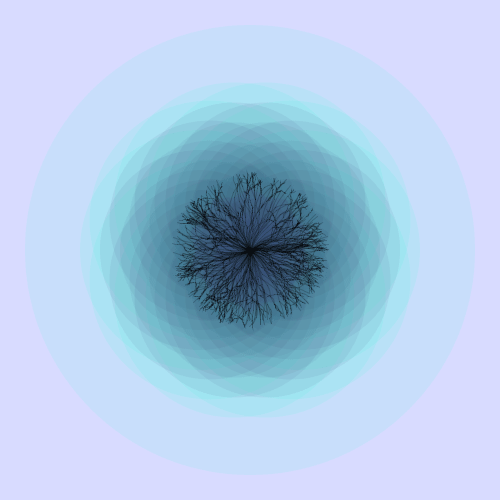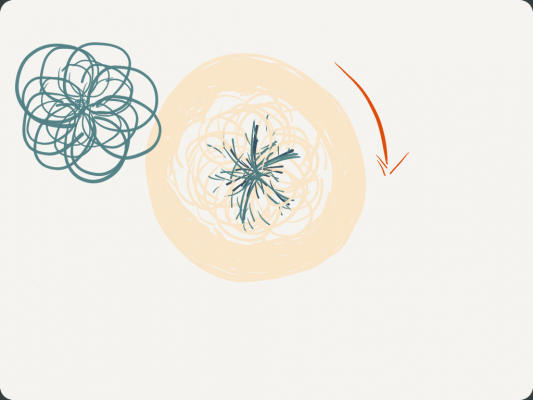For this assignment, I had the idea of creating an elegant design using recursion. Inspired by Diana Lange’s recursive flower, I played with the design to recreate the human pupil. In my opinion, playing with transparency added an effect of depth. I am not entirely satisfied with the rotating effect.
1 2 3 4 5 6 7 8 9 10 11 12 13 14 15 16 17 18 19 20 21 22 23 24 25 26 27 28 29 30 31 32 33 34 35 36 37 38 39 40 41 42 43 44 45 46 47 48 49 50 51 52 53 54 55 56 57 58 59 60 61 62 63 64 65 66 67 68 69 70 71 72 73 74 75 76 77 78 79 80 81 82 83 84 85 86 87 88 89 90 91 92 93 94 95 96 97 98 99 100 101 102 103 104 105 106 107 108 109 110 111 112 113 114 115 116 117 118 119 120 121 122 123 124 125 126 127 128 129 130 131 132 133 134 135 136 | // Inspired by Diana Lange String myName = "samakanbour"; int nFramesInLoop = 10; int size = 500; int nElapsedFrames; Circles c; Flower f; float iteration; void setup () { size(size, size); nElapsedFrames = 0; frameRate (nFramesInLoop); smooth(); iteration = 0; } void draw () { iteration ++; float modFrame = (float) (frameCount % nFramesInLoop); float p = modFrame / (float)nFramesInLoop; fill (10, 250, 200, 20); background (#D8DBFF); noStroke(); ellipse (width/2, height/2, size*.9, size*.9); f = new Flower (200, width/2, height/2, size * 0.16, 0.1); c = new Circles (width/2, height/2, 6, p); fill (#000000); f.display(); if (iteration < = nFramesInLoop){ saveFrame("output/"+ myName + "-loop-" + iteration + ".png"); } } class Circles { private int cx, cy; Circles (int x, int y, int n, float p) { this.cx = x; this.cy = y; createCircles(n, p); } private void createCircles(int n, float p) { float per = p; if (p > 0.5) { per = 1 - p; } float radius = size * 0.08 * per + size/10; int nSpokes = 10; if (n == 1){ return; } else { for (int i=0; i < nSpokes; i++) { float armAngle = (p + i) * (TWO_PI/nSpokes); float px = cx + radius*cos(armAngle); float py = cy + radius*sin(armAngle); ellipse (px, py, size * 0.08 * n, size * 0.08 * n); } fill (10*n, 10*n, 20*n, 30*n/10); createCircles(n-1, p); } } } class Anchor { private float angle, minAngle, maxAngle, length; private int centerX, centerY; private ArrayList branches; Anchor (float angle, float minAngle, float maxAngle, float length, int centerX, int centerY, float minNext ) { this.angle = angle; this.minAngle = minAngle; this.maxAngle = maxAngle; this.length = length; this.centerX = centerX; this.centerY = centerY; branches = new ArrayList(); createBranches(angle, centerX, centerY, 0, random (length /15.0, length /2.0), 0, minNext); } public int getCenterX () { return centerX; } public int getCenterY () { return centerY; } private void createBranches (float fAngle, float startX, float startY, float totalLength, float flength, int count, float minNext) { float mangle = minAngle / 4; float weighing = 0.5; float [] [] points = new float [5] [2]; if (flength>80) points = new float [6] [2]; points [0] [0] = points [1] [0] = startX; // startpunkt x points [0] [1] = points [1] [1] = startY; // startpunkt y points [points.length-2] [0] = points [points.length-1] [0] = startX + cos (radians (fAngle)) * flength; // endpunkt x points [points.length-2] [1] = points [points.length-1] [1] = startY + sin (radians (fAngle)) * flength; // endpunkt y if (flength< =80) { points [2] [0] = startX + cos (radians (fAngle+mangle)) * dist (startX, startY, points [points.length-1] [0], points [points.length-1] [1]) * weighing; // kontrollpunkt x points [2] [1] = startY + sin (radians (fAngle+mangle)) * dist (startX, startY, points [points.length-1] [0], points [points.length-1] [1]) * weighing; // kontrolltpunkt y } else { weighing = 0.4; points [2] [0] = startX + cos (radians (fAngle+mangle)) * dist (startX, startY, points [points.length-1] [0], points [points.length-1] [1]) * weighing; // kontrollpunkt x points [2] [1] = startY + sin (radians (fAngle+mangle)) * dist (startX, startY, points [points.length-1] [0], points [points.length-1] [1]) * weighing; // kontrolltpunkt y weighing = 0.6; points [3] [0] = startX + cos (radians (fAngle+mangle)) * dist (startX, startY, points [points.length-1] [0], points [points.length-1] [1]) * weighing; // kontrollpunkt x points [3] [1] = startY + sin (radians (fAngle+mangle)) * dist (startX, startY, points [points.length-1] [0], points [points.length-1] [1]) * weighing; // kontrolltpunkt y } //----- add new branch branches.add (new Branch (points)); //----- calculate current branch length totalLength += flength; //----- recursion if (count < 25 && flength > 1.5) { count++; int dir = (int) random(0, 3); //----- one or two anchors if (dir < = 1) { float nextflength = flength * random(0.75, 1.20); if ( totalLength+nextflength < length) createBranches (fAngle + random(minAngle*2, maxAngle*2), points [points.length-1] [0], points [points.length-1] [1], totalLength, nextflength, count, minNext); } else { float nextflength = flength * random(minNext, 1.05); if ( totalLength+nextflength < length) createBranches (fAngle + minAngle/2, points [points.length-1] [0], points [points.length-1] [1], totalLength, nextflength, count, minNext); nextflength = flength * random(minNext, 1.05); if ( totalLength+nextflength < length) createBranches (fAngle + maxAngle/2, points [points.length-1] [0], points [points.length-1] [1], totalLength, nextflength, count, minNext); } } } public void display () { Branch br; for (int i = 0; i < branches.size(); i++) { br = (Branch) branches.get (i); br.display(); } } } class Branch { private float [] [] points; Branch (float [] [] points) { this.points = new float [points.length] [points[0].length]; arrayCopy (points, this.points); } public void display () { noFill(); stroke (0, 50); beginShape(); for (int i = 0; i < points.length; i++) { curveVertex (points [i] [0], points [i] [1]); } endShape(); } } class Flower { private Anchor [] anchor; private int num, centerX, centerY; private float minNext, d; private float [] angles, length; Flower (int num, int centerX, int centerY, float d, float minNext) { this.num = num; this.centerX = centerX; this.centerY = centerY; this.d = d; this.minNext = minNext; this.angles = new float [num]; this.length = new float [num]; createFlower(); } private void createFlower() { anchor = new Anchor [num]; for (int i = 0; i < num; i++) { angles [i] = random (360); } arrayCopy (sort (angles), angles); float minLength = d*10, maxLength = 0; for (int i = 0; i < length.length; i++) { length [i] = d; if (length [i] < minLength) minLength = length [i]; if (length [i] > maxLength) maxLength = length [i]; } } public void display(){ for (int i = 0; i < num; i++) { anchor[i] = new Anchor (angles [i], -20, 20, length [i], centerX, centerY, minNext); anchor[i].display(); } } } |

